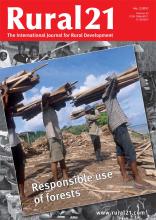Land Library
Welcome to the Land Portal Library. Explore our vast collection of open-access resources (over 74,000) including reports, journal articles, research papers, peer-reviewed publications, legal documents, videos and much more.
/ library resources
Showing items 235 through 243 of 394.The outcome of the Madrid High-Level Meeting on Food Security can be considered a victory for those who want to see the multilateral governance of the global food and agriculture system improved and strengthened, and conducted within the Right to Adequate Food framework.
The importance of forests for climate change mitigation and species conservation, as water stores and oxygen producers, soil protectors and humus providers, is well known. However, over 13 million hectares of forest are lost each year, mainly in the tropics.
Establishing a rational forest policy is a difficult task for many countries. One of the reasons for this is that different policy sectors - such as energy policy, foreign trade policy, are closely linked to forest policy and the interests of a multitude of actors need to be accommodated.
Certification is viewed as one of the most effective ways of curbing unregulated logging and conserving natural forests in the tropics. In the meantime, there are several dozen certifying organisations.
The Congo Basin Forest Partnership aims to reconcile forest conservation with forest use. This article explains what a “policy network” of this sort can achieve and where its limits lie.
Against the backdrop of increasing deforestation in Natural Protected Areas due to illegal logging and shifting agriculture, the Peruvian association DRIS has implemented a programme in three districts of the country.
In rural areas of many developing countries fuelwood constitutes the only energy source – often with negative impacts on humans and the environment. Wise management and modern technology can guarantee a sustainable use of this valuable resource, as some examples from Latin America demonstrate.
The number of woodfuel consumers in Africa is projected to increase from around 2.5 billion in 2004 to 2.7 billion by 2030, with sub-Saharan Africa accounting for the highest increase.
Every year, 13 million hectares of forest are lost worldwide; that is an area the size of Austria and Switzerland combined. 90 percent of this deforestation involves tropical forests.

